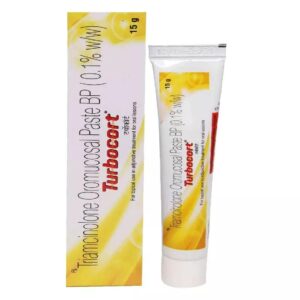TRIAMCINOLONE + OCIMUM SOACTUM
Triamcinolone: Triamcinolone is a synthetic corticosteroid drug that is commonly used for its anti-inflammatory effects. It is available in various forms, including topical creams, ointments, injections, and nasal sprays.
Triamcinolone is used to treat a wide range of conditions, including allergies, asthma, skin inflammation, arthritis, and certain types of cancers. It works by suppressing the immune system’s response to inflammation, reducing swelling, itching, and redness.
The dose and duration of treatment with triamcinolone vary depending on the condition being treated. For skin conditions, a thin layer of the cream or ointment is applied to the affected area 2-4 times daily. In some cases, the healthcare provider may also administer triamcinolone by injection, either into a joint, muscle, or directly into the bloodstream.
Like all medications, triamcinolone can cause side effects, although not everyone experiences them. Some common side effects include skin irritation, dryness, and thinning, especially with prolonged use or in high doses. Other side effects may include adrenal suppression, increased blood pressure, fluid retention, weight gain, mood changes, and increased risk of infections or delayed wound healing.
It is important to use triamcinolone as prescribed by a healthcare professional and to follow the recommended dosage and duration of treatment. Long-term use should be avoided if possible to minimize the risk of side effects. It is also important to inform your doctor about any other medications or medical conditions you have before starting triamcinolone.
Ocimum Soactum: Ocimum Sanctum, also known as Holy Basil or Tulsi, is a medicinal herb primarily found in India and Southeast Asia. It has been used for centuries in traditional medicine for its various health benefits.
Use: Ocimum Sanctum is commonly used to treat a wide range of health conditions such as respiratory disorders, digestive problems, skin diseases, and stress-related conditions. It is also considered an adaptogen, meaning it helps the body adapt to stress and promotes overall well-being. Additionally, Holy Basil is known for its antioxidant, anti-inflammatory, and antimicrobial properties.
Mechanism of Action: The exact mechanism of action of Ocimum Sanctum is still not fully understood, but it is believed that the herb works by modulating various biochemical pathways in the body. It contains numerous active compounds such as eugenol, rosmarinic acid, and flavonoids, which contribute to its therapeutic effects.
Dose: Holy Basil is available in various forms, including capsules, tablets, tinctures, and teas. The recommended dose may vary depending on the specific product and the condition being treated. It is recommended to follow the instructions provided on the packaging or consult a healthcare professional for the appropriate dosage.
Side Effects: Generally, Holy Basil is considered safe when used in recommended doses. However, there have been rare reports of side effects associated with its use, including upset stomach, nausea, headache, and skin irritation. It may also interact with certain medications, so it is important to speak with a healthcare professional before starting any new supplements or herbal remedies.
Note: It is crucial to consult a healthcare professional before using Ocimum Sanctum, especially if you have any underlying medical conditions or are taking other medications. Herbal remedies may have interactions and contraindications that should be considered for safe and effective use.

